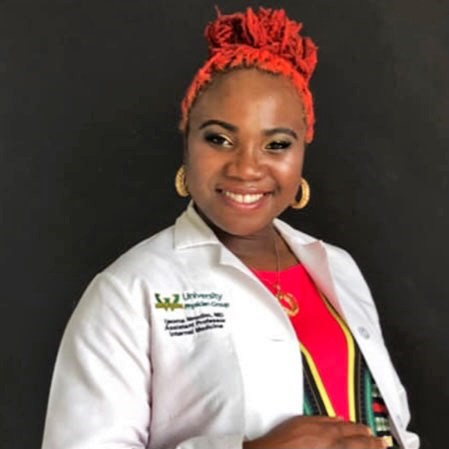The Association of American Medical Colleges has published an article by a Wayne State University School of Medicine faculty member describing the birth of the school’s Healing Between the Lines curriculum on systemic inequities and how they lead to health disparities.
“The deadly legacy of redlining — and a mission to reverse it,” written by Ijeoma Nnodim Opara, M.D., assistant professor of Internal Medicine and Pediatrics, was published under the AAMC’s Viewpoints section on its website.
Redlining, begun in the 1930s, was the practice of identifying non-White populations as unworthy of mortgage loans. The practice, a systematic denial of services, resources and opportunities, and a basis for segregation, Dr. Opara writes, undermined the health and well-being of entire communities, and continues to do so to this day.

“Five to 15. Those were the figures that kept ringing in my ears as my chest tightened and hot tears welled up in my eyes. I was listening to my mentor at Wayne State University School of Medicine in Detroit share findings from their health equity research at a small meeting three years ago,” she writes. “… Black Detroiters die five to 15 years earlier than their White counterparts as a result of decades of structural racism that has denied resources and opportunities to Black communities. It hurt me to note that despite surviving such violence and upheaval as the transatlantic slave trade and Jim Crow segregation, my community in Detroit was dying prematurely due to the social pathology of multigenerational trauma and injustice.”
Rather than despair, Dr. Opara said she decided to leverage her position as a physician, medical educator and community organizer to create a curriculum that teaches medical students and residents about the impact of structural injustice on the health of Black Detroiters, and equip them with advocacy skills in a “community–academia collaboration that positioned community partners as the lead.”
She, along with a group of trainees, community leaders and faculty, developed the course, in which the legacy of redlining was identified as a “critical driver” of the lifespan gap in Detroit. Healing Between the Lines was launched in the winter of 2020.
One legacy of redlining: When it comes to health, your ZIP code matters more than your genetic code, Dr. Opara noted. Those who live in redlined areas today experience not just health disparities, but generational poverty, increased stress and mental illness, and more engagement with the criminal justice system. They suffer higher rates of diabetes and increased morbidity from infectious diseases like COVID-19, and higher rates of heart failure.
“If physicians are going to improve the health of all, they need to be trained in structural competency,” Dr. Opara writes. “That is, they need to understand how health conditions and behaviors are the downstream consequences of such upstream determinants as laws, policies and regulations.”
That was the philosophy behind Healing Between the Lines, co-created with Selena Rodriguez, M.D., and medical students Cedric Mutebi, Capricia Bell and Taylor Barrow. Dr. Bell has since graduated medical school.
Course participants meet two hours every other week for six months. They study historical eras and efforts designed to curtail the power of formerly enslaved people. They then spend two months learning community activism and partnership skills, cultivating cultural humility by adopting a posture of open-mindedness and life-long learning. Their last two months are spent learning to identify multidisciplinary and community collaborators and building coalitions.
Healing Between the Lines creators have presented their work at local and national conferences. Plans are underway to assist other interested institutions in developing similar programs and curriculum.
“This is the work we believe is critical if we are to close the unjust five- to 15-year racial lifespan gap in Detroit,” Dr. Opara writes. “This is what is critical to training and developing our current and future health care workforce if we are to achieve health equity and justice in our nation. This is what is critical if we are to transform a longstanding American nightmare into the American dream in which anyone — regardless of their race, gender, class or ability — can live their healthiest and best possible lives.”